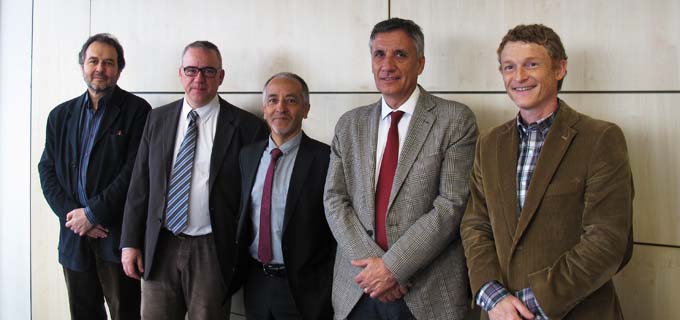Presenting CRESIB's First Spin-Off
INNOVEX THERAPEUTICS S.L., the first spin-off to emerge from an ISGlobal research centre, was launched on March 19.
20.03.2014
INNOVEX THERAPEUTICS S.L. is the first spin-off to emerge from the Barcelona Health Research Centre, CRESIB, which is an ISGlobal research centre. It was officially constituted on March 19.
The new company, the first of its kind in Spain, will engage in research and development related to extracellular vesicles and their application in malaria vaccines and/or diagnostic tests. INNOVEX THERAPEUTICS S.L will be located at the Germans Trias i Pujol Health Sciences Research Institute (IGTP) in Badalona, Spain, which has given the company use of its facilities for three years. The founding partners are Dr. Hernando A. del Portillo, an ICREA researcher professor attached to CRESIB who holds 80% of the capital, Dr. Francesc E. Borràs, an IGTP researcher and professor at the Autonomous University of Barcelona, with 10% of the capital, ICREA and CRESIB with 4% each, and the IGTP with 2%.
Dr. del Portillo, co-founder, manager, and Chief Scientific Officer of the spin-off explained the origin of the project. "When I arrived from Brazil in 2007 with funding from the Cellex Foundation, the Spanish Ministry of Science and Foundation, the Catalan Agency for Management of University and Research Grants (AGAUR), and the European Virtual Institute of Malaria Research (EVIMalaR), I formed a Plasmodium vivax research group with the aim of discovering new antigens and developing a vaccine to protect against P. vivax, one of the parasites that causes malaria in humans. This is the idea that forms the basis of the new company."
Dr. Antoni Plasència, Technical Director of CRESIB, stated that "the creation of the CRESIB spin-off demonstrates our institution's commitment to transferring knowledge to society and ensuring that the results of research reach the community".
Scientific work
The experimental work that led to the creation of the spin-off involved a mouse malaria model in which the malaria parasite that affects rodents, just like the human malaria parasite, P. vivax, invades young red blood cells known as reticulocytes. As these cells differentiate into mature red blood cells, they selectively secrete membrane proteins in the form of nanovesicles called exosomes. As Dr. Del Portillo explained, "We not only demonstrated that these nanovesicles contained parasite proteins, but also, and much more importantly, showed that when they were used in combination with adjuvants in immunisation tests with mice, they conferred complete, long-lasting protection against malaria. Exosomes from P. vivax–infected reticulocytes could therefore be used to create a new malaria vaccine. These results have been patented in Spain and Europe and are protected in a further eight countries".
Dr. del Portillo and Dr. Borràs met in Sweden in 2012 at the first meeting of the International Society for Extracellular Vesicles (ISEV). Dr. Borràs is an expert in human immunology who studies the molecular basis of immune responses generated by dendritic cell–derived extracellular vessels.
The idea of creating a spin-off like INNOVEX THERAPEUTICS S.L. was spawned at this first meeting in Sweden. "Given the relevance of our research to public health, Dr. del Portillo negotiated the transfer of the malaria patent for a new spin-off with ICREA and CRESIB and I negotiated the use of the IGTP facilities to launch the project", concluded Dr. Borràs.



